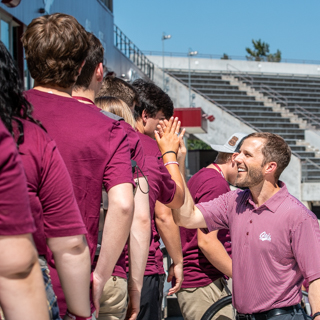University Design Team
April 28, 2020
Dear UM Family,
As I shared in a campus message earlier this month, it is important that as we navigate the near-term challenges presented by the COVID-19 pandemic, we also work collectively and thoughtfully to prepare UM for long-term success and impact. Our university’s work – to foster inclusive prosperity, to expand the boundaries of human knowledge and to sustain American democracy – is vitally important not just to our city and our state, but also to our entire country. We are the fortunate beneficiaries of the efforts of earlier generations who guided our flagship university through challenges across its 127-year history. Those who came before us have been good stewards of this institution through periods of adaptation, and it is now our turn to thoughtfully, strategically and courageously design the continued and new characteristics that should embody a flagship of the future.
To this end, I am pleased to share that we are forming a group – a University Design Team (UDT) – to think boldly about how we can collectively design the UM of tomorrow.
To be clear, our efforts to adapt to the immediate and near-term challenges of COVID-19 will continue. As you’re aware, earlier this month we formed a cross-sector, mission-based team to analyze the near- and medium-term steps we must take to prepare for summer and fall 2020 and a return to in-person instruction. These efforts have been – and continue to be – essential in achieving our mission and meeting our students’ needs during the evolving COVID-19 pandemic. As the global community works to limit the spread of this virus and identify an effective vaccine and/or treatment, we will continue to adjust operations in the best interest of our students and our community.
Our proactive planning, however, must look beyond fall 2020. UM’s success depends on our ability to plan for a much longer-range future.
The UDT will play a critical role in this. Drawing upon the perspectives of our campus community and our external stakeholders, including community leaders, business leaders, admitted students and prospective students, the UDT will consider the challenges and opportunities faced by institutions of higher education and will identify design principles and potential strategies to position UM as a flagship for America’s future.
In particular, I will ask the UDT – and our wider campus community – to explore how UM can best:
- provide an education that prepares our students as both career-ready and tomorrow-proof.
- expand our conception of education to include learners at all stages of life and career.
- expand the reaches of knowledge through research and graduate programs of national excellence and impact.
To ensure an integrated approach to this work, the UDT includes members of our shared governance bodies; members of our cross-sector, mission-based team that has been planning for this fall; members of our Priorities for Action teams that have been focused on making tangible progress in each of our five priority areas; and additional campus colleagues who will help us think strategically and inclusively about UM’s future. The group also will draw upon previous discussions, including the work done by the Strategic Planning Coordinating Council, the University Planning Committee and the ideas emerging in the Communities of Excellence.
I have asked Adrea Lawrence, dean of the Phyllis J. Washington College of Education, and Paul Gladen, director of AccelerateMT and the Blackstone LaunchPad, to co-chair this team. The members include:
- Brad Allen, professor, School of Visual and Media Arts
- Justin Angle, professor, Department of Management and Marketing
- Claire Arcenas, professor, Department of History
- Charity Atteberry, academic adviser, Department of Teaching and Learning
- Doug Emlen, professor, Division of Biological Sciences
- Ethan Hanley, ASUM business manager
- Kirk Lacy, vice provost for two-year partnerships
- Maricel Lawrence, executive director of UM Online
- Nathan Lindsay, vice provost for Academic Affairs
- Jeanne Loftus, director of the Global Leadership Initiative
- Hilary Martens, professor, Department of Geosciences
- Libby Metcalf, professor, Department of Society and Conservation
- Jacinda Morigeau, academic coordinator, Upward Bound
- Chris Palmer, professor, Department of Chemistry
- Brian Reed, associate vice provost for Student Success
- Megan Stark, professor, Mansfield Library
- Hillary Wandler, professor, Alexander Blewett III School of Law
- Julie Wolter, professor, School of Speech, Language, Hearing and Occupational Sciences
UDT Support Members
- Hadley Jackson, program manager, Office of the Provost
- Jenny Lavey, editor-in-chief, Montanan Magazine
- Jen Sauer, associate marketing director
Each UDT member will participate not as a representative of a particular group or unit, but rather as an institutional citizen focused on the collective future of our university. Please follow the UDT’s progress here. I hope that you will contribute to our collective thinking as the UDT provides opportunities to engage. I am grateful to each of the individuals above – and to all of you – for an abiding commitment to the UM of today and tomorrow.
We are humbled by UM’s 127-history. And we should be equally proud of its future. Building that future starts now.
Seth